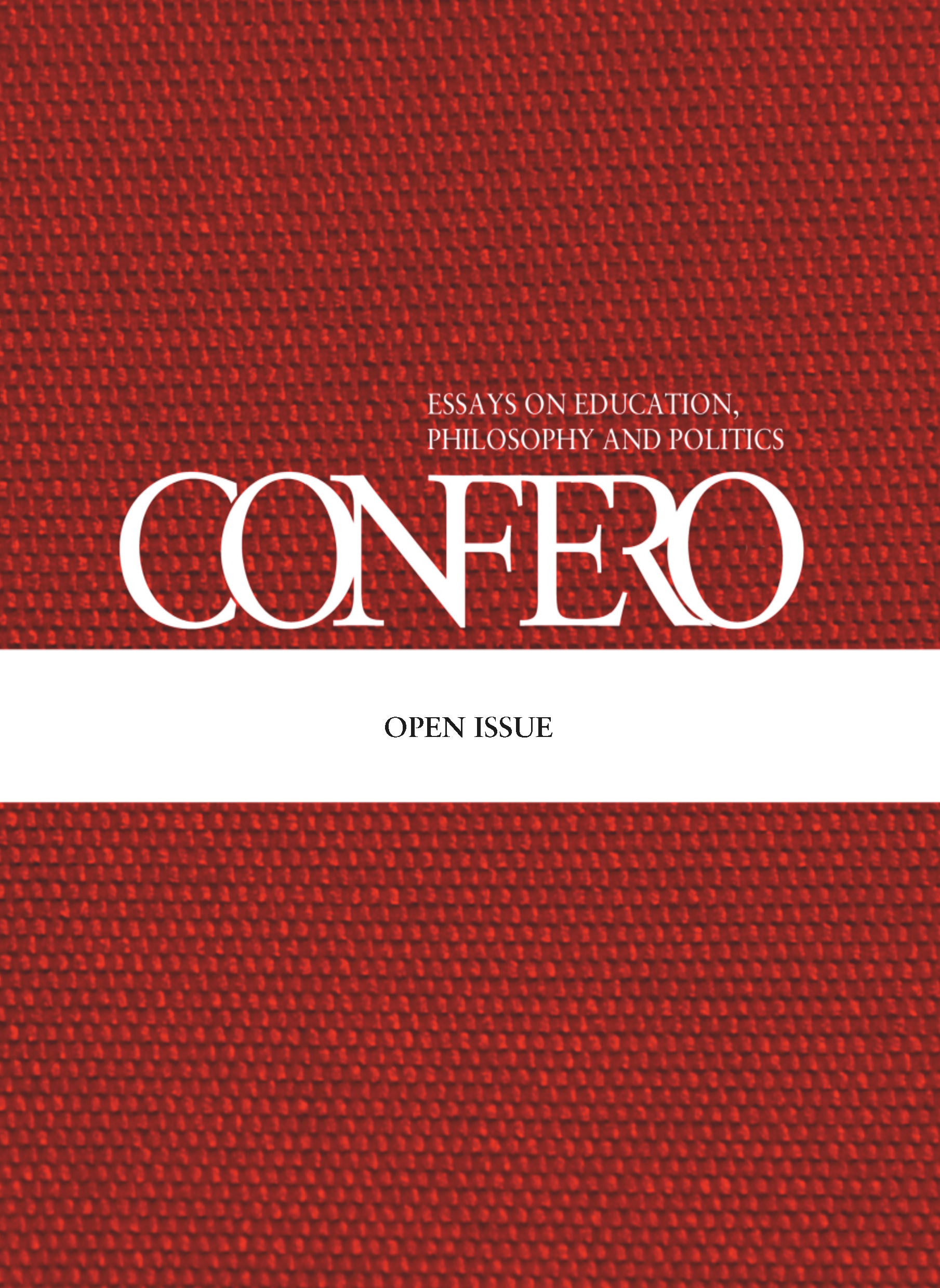‘As if he had come into the world like Minerva’
Ayn Rand's (anti-)educational philosophy
DOI:
https://doi.org/10.3384/confero.2001-4562.211215Abstract
No abstract available.
References
Achterhuis, H. (2011). De utopie van de vrije markt. Rotterdam: Lemniscaat.
Ayn Rand interview with Tom Snyder. (1979). Retrieved December 23, 2019, from https://www.youtube.com/watch?v=cAFKnfN4bfk
Beets, S. D. (2015). BB&T, Atlas Shrugged, and the Ethics of Corporation Influence on College Curricula. Journal of Academic Ethics, (13), 311–344.
Biesta, G. (2013). The Beautiful Risk of Education. Boulder: Paradigm Publishers.
Burch, P. (2009). Hidden Markets: The New Education Privatization. New York: Routledge.
Burns, J. (2009). Goddess of the Market. Ayn Rand and the American Right. Oxford: Oxford University Press.
Carson, J. (2005). Objectivism and Education: A Response to David Elkind’s “The Problem with Constructivism.” The Educational Forum, 69(3), 232–238.
Clynes, T. (2017). Peter Thiel Thinks You Should Skip College, and He’ll Even Pay You For Your Trouble. Newsweek Magazine. Retrieved from https://www.newsweek.com/2017/03/03/peter-thiel-fellowship-college-higher-education-559261.html
Culler, J. (1985). On Deconstruction. Theory and Criticism after Structuralism. Ithaca, NY: Cornell University Press.
Do schools kill creativity? Sir Ken Robinson. (2007). Retrieved December 27, 2019, from https://youtu.be/iG9CE55wbtY
Geoghegan, T. (2012). Ayn Rand: Why is she so popular? Retrieved January 3, 2020, from https://www.bbc.com/news/magazine-19280545
Heller, A. C. (2009). Ayn Rand and the World She Made. New York: Anchor Books.
Jones, G. H. (2010). Universities, the Major Battleground in the Fight for Reason and Capitalism. Academe, 96(4), 34–37.
Love Brown, S. (1999). Ayn Rand: The Woman Who Would Not Be President. In M. R. Gladstein & C. M. Sciabarra (Eds.), Feminist Interpretations of Ayn Rand (pp. 275–294). University Park, PA: Pennsylvania State University Press.
Nighan, R. A. (1974). Ayn Rand’s Concept of the Educated Man. [Doctoral dissertation, Loyola University Chicago]. Retrieved from https://ecommons.luc.edu/luc_diss/1403
Peikoff, L. (2014). Teaching Johnny to Think. A Philosophy of Education Based on the Principles of Ayn Rand’s Objectivism. (M. Trollope, Ed.). Santa Ana: Ayn Rand Institute Press.
Rand, A. (n.d.). Introducing Objectivism. Retrieved December 23, 2019, from https://courses.aynrand.org/campus-courses/introducing-objectivism/
Rand, A. (1963). The Goal of My Writing. In The Romantic Manifesto. Retrieved from https://courses.aynrand.org/works/the-goal-of-my-writing/
Rand, A. (1964). The Virtue of Selfishness. A New Concept of Egoism. New York: New American Library.
Rand, A. (1965). The Psycho-Epistemology of Art. In The Romantic Manifesto. Retrieved from https://courses.aynrand.org/works/the-psycho-epistemology-of-art/
Rand, A. (1971a). Ayn Rand at the Ford Hall Forum on The Moratorium on Brains. Retrieved December 23, 2019, from https://courses.aynrand.org/campus-courses/ayn-rand-at-the-ford-hall-forum/
Rand, A. (1971b). The New Left: The Anti-Industrial Revolution. New York: New American Library.
Rand, A. (2007a). Atlas Shrugged. London: Penguin Books.
Rand, A. (2007b). The Fountainhead. London: Penguin Books.
Reid, J. (2013). “The Ayn Rand School for Tots”: John Dewey, Maria Montessori, and Objectivist Educational Philosophy during the Postwar Years. Historical Studies in Education/Revue d’histoire de l’éducation, 25(1), 73–94.
Torbjo?rn, T. (2013). Understanding Ethics. Edinburgh: Edinburgh University Press.
Trubek, A. (2010). The Problem of Free Books. Retrieved January 3, 2020, from https://www.good.is/articles/the-problem-of-free-books
Žižek, S. (2002). The Actuality of Ayn Rand. The Journal of Ayn Rand Studies, 3(2), 215–227.
Žižek, S. (2009). Violence. Six Sideways Reflections. London: Profile Books.
Downloads
Published
Issue
Section
License
Copyright (c) 2021 Anouk Zuurmond

This work is licensed under a Creative Commons Attribution 4.0 International License.
As Confero is an open access journal, this means that anyone who can access the Internet can freely download and read the journal. There are no commercial interests for Linköping University Electronic Press or Confero in publishing the journal.
The core idea of open access is that copyright remains with the author(s). However, we publish with the agreement of the author that if she or he decides later to publish the article elsewhere, that the publisher will be notified, prior to any acceptance, that the article has already been published by Confero.
When publishing with Confero, it is with the agreement of the author that if they make their article available elsewhere on the internet (for example, on their own website or an institutional website), that they will do so by making a link to the article as published in Confero using the Digital Object Identifier (DOI) number of the article and acknowledge in the text of the site that the article has been previously published in Confero.
As evident by the markers on our homepage, Confero falls under the Creative Commons licence abbreviated BY. This means that we allow others to use, spread and elaborate on the published articles, as long as they acknowledge who published it and where it was originally published.



